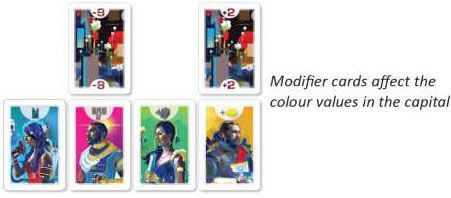

Components
- 72 Profession Cards
- 4 Capital Cards
- 4 Modifier Cards
- 8 Gold Discs
Object of the Game
Players take turns playing cards either in front of themselves (their hometown) or into the middle of the table (the capital).
Playing a card in the capital lets you take a special action, while cards in your hometown are worth points at the end of the game.
At the end of a round the total value of a color in your hometown must not exceed that color's value in the capital, or else you will lose those cards. The player with the most points after 3 rounds, wins the game.
Setup
Place the 4 Capital Cards face up in the middle of the table.
Shuffle the Profession Cards and put them in a face-down Deck next to the capital cards. Draw the top card from the deck and place it face up on the corresponding Capital Card. The special action symbol on top of the capital card should be visible.
Shuffle the Modifier Cards, and deal one card to each player. Whoever gets the highest value (+4 is highest; -3 is lowest) is the Starting Player in the first round. Collect the cards again, shuffle them and place them in a face-down deck next to the capital cards.
Put the Gold Discs in a pile next to the modifier cards.

Game Play
The game is played over 3 rounds. Each round consists of the following 3 steps (executed in the order shown):
- Choose cards
- Play Cards
- Round End
1. Choose Cards
The Starting Player of the round deals a number of profession cards into each player's hand:
- In a 2-3 player game: Each player gets 6 profession cards
- In a 4 player game: Each player gets 5 profession cards
Each player simultaneously chooses 2 of their dealt cards and places them face down in front of themselves. When all players have chosen 2 cards, everyone passes their remaining cards to their left-hand neighbor.
Then, the process is repeated one more time: every player chooses 2 more cards and passes the remaining card(s) to their left-hand neighbor. The final card(s) that are passed must be kept by the receiving player.
All players pick up their 4 chosen cards, and each should now have a starting hand of either 6 (with 2-3 players) or 5 cards (with 4 players).
2. Play Cards
The Starting Player begins, and then the players take turns in a clockwise order.
On your turn you must play one card from your hand face up
- into your HOMETOWN (in front of you)
- or into the CAPITAL (in the middle of the table).
When you play a card into the CAPITAL, you must immediately carry out the corresponding special action.
Cards of the same color should be grouped together - both in your hometown and in the capital. The cards should overlap so that their values are visible.

Example: Bob plays a blue card into the Capital and takes the agent action.
Special Actions
If you play a card into the CAPITAL, you MUST (if possible) perform the corresponding special action:

Scholar (green)
Draw the top profession card from the deck and take it to your HAND. If the deck is empty, you do not draw a card.

Merchant (yellow)
Take one gold disc from the pile and place it in your play area. If the pile is empty, you do not gain a gold disc.

Agent (blue)
Draw the top card from the modifier deck and look at it. Then, without revealing the card, place it face down above one of the capital cards. If the modifier deck is empty, you do not draw a card.

Cleric (pink)
Take the lowest valued card in either blue, yellow or green (if any) from the Capital and place it face up in your HOMETOWN (not your hand!).
Example (Agent):
Bob secretly looks at a
modifier card and decides
to place it above the Merchant.
Example(Cleric): Mary chooses
to take a blue card.
She takes the lowest valued blue card
and places it into her hometown.
3. Round End
When one player has no cards left at the end of their turn, all other players get one last turn before the round ends.
Important: After all players have taken their last turn, any remaining cards in a player's hand are now placed face up into their HOMETOWN. Then, go through the steps described below.
Check Limits and Discard Cards
First, reveal any modifier cards lying above the capital cards.
Then, each player compares the total value of each color in their HOMETOWN with the total value of that color in the CAPITAL.
Important: A modifier card will increase or decrease the total value for a color in the Capital.

For each color: If the total value in your hometown exceeds the total value in the capital, you must discard all cards of this color from your hometown.
Use of Gold: If you exceed the limit in one or more colors, you may spend gold discs equal to the difference to avoid having to discard cards.
For each 1 disc spent, you increase your limit for one color by 1. Used discs are put back into the gold pile.
The player discards 3 discs to avoid having to discard the blue and yellow cards. Only the pink card must be discarded.
Bonus Cards
For each color, the player with the highest total value in their HOMETOWN gets to take the highest valued card in this color from the CAPITAL as a bonus card.
In case of a tie, the one of the tied players that was first in turn order takes the highest card, then the second tied player in turn order takes the second highest card (if any), and so on.
Place the bonus card FACE DOWN in front of you (not in your hometown). This bonus card will be worth bonus points at the end of the game.

Example: John, Mary and Bob all have the same total value in yellow in their hometown. Since John was the Starting player, he gets the card valued 6 as a bonus card.
Mary is sitting left of John and takes the card valued 4. Bob gets no bonus card since there are no yellow cards left in the Capital.
Preparing for Next Round
Shuffle all 4 modifier cards again and make a new deck.
The player with the highest total value of cards (in all colors) in their HOMETOWN (bonus cards do not count) becomes the starting player in the next round.
In case of a tie, the one of the tied players sitting nearest the previous starting player (going clockwise), becomes the new starting player.Start a new round by dealing and choosing new cards (see "1. Choose Cards").
Note: all remaining cards in the CAPITAL and in the players' HOMETOWNS are kept for the next round.
End of the Game
After the 3rd round, the game ends. Now, each player tallies their final points as follows:
The total value of all remaining cards in your HOMETOWN
The total value of any bonus cards won
1 point per unused gold disc
The player with the highest total score wins the game.
In case of a tie, the tied player with the most cards of value 6 (among their hometown and bonus cards) wins. If it's still a tie, count the number of cards of value 5, then cards of value 4, and so on.
Clarifications
Agent: There is not limit to the number of modification cards that can be played above each color in the capital
Cleric: When playing a pink card in the capital, you cannot choose to take another pink card. You must choose one of the other colors and then take the lowest valued card of that color into your hometown (if possible).
Scholar: If a player plays a green card into the capital as his/her last card, the end of round is not triggered since she immediately must draw a new card from the deck.
Rare case: If, at the beginning of the 3rd round, there are not enough cards left in the deck to deal the full number of cards to each player, instead deal as many cards as there are left , with an equal number of cards to each player.
Continue Reading


